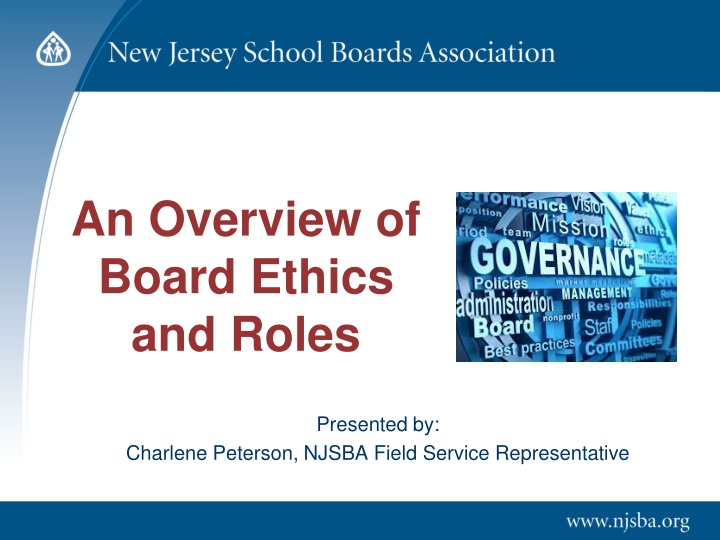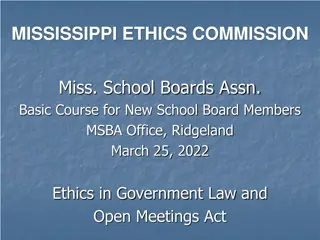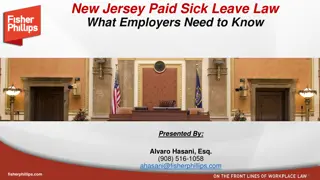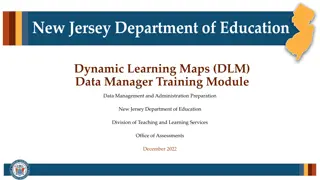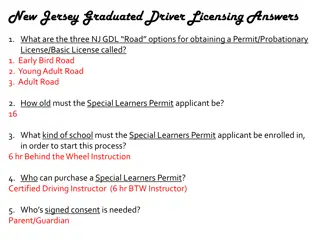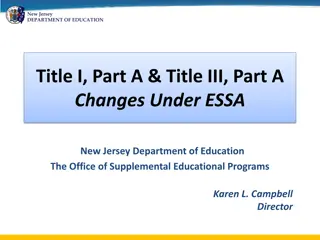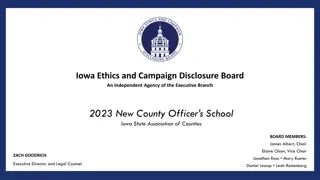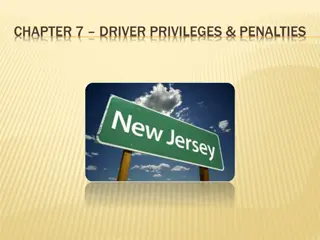Guidelines for School Board Ethics and Roles in New Jersey
School board members and local administrators in New Jersey are bound by the School Ethics Act, which emphasizes transparency, accountability, and avoidance of conflicts of interest. Mandatory training requirements and adherence to a strict Code of Ethics help ensure that public trust is upheld. The School Ethics Commission oversees compliance and can recommend penalties for violations, including reprimand, suspension, or removal from office.
Download Presentation

Please find below an Image/Link to download the presentation.
The content on the website is provided AS IS for your information and personal use only. It may not be sold, licensed, or shared on other websites without obtaining consent from the author.If you encounter any issues during the download, it is possible that the publisher has removed the file from their server.
You are allowed to download the files provided on this website for personal or commercial use, subject to the condition that they are used lawfully. All files are the property of their respective owners.
The content on the website is provided AS IS for your information and personal use only. It may not be sold, licensed, or shared on other websites without obtaining consent from the author.
E N D
Presentation Transcript
An Overview of Board Ethics and Roles Presented by: Charlene Peterson, NJSBA Field Service Representative
School Ethics Act N.J.S.A. 12-23.1 (effective April 1992) It is essential that the conduct of members of local boards of education and local administrators hold the respect and confidence of the people. These board members and administrators must avoid conduct which is in violationof their public trust or which creates a justifiable impression among the public that such trust is being violated.
Components of School Ethics Act As a public official, a board member has responsibilities to the public that must be adhered to even when acting as a parent or private citizen. File financial and relative disclosure statements Mandatory training in responsibilities of school board membership Avoid conflicts of interest Adhere to the Code of Ethics
New Jersey School Boards Association Serving Local Boards of Education Since 1914 Mandatory Training Requirements When Must Complete Training 1st year of 1st term Training Required Topic(s) Governance I New Board Member Orientation. Includes required training on HIB & CSA Evaluation 2nd year of 1st term 3rd year of 1st term Year following every re-election or re-appointment Governance II Finances Governance III Student Achievement Governance IV Legal Updates How to complete training: online, in-person (prior to COVID), two weekend options for Gov I (prior to COVID), & at NJSBA s Workshop
School Ethics Commission (SEC) 5 Non-school Officials 2 2 School School Board Members Administrators 9 members appointed by the governor for a 3-year term (maximum 5 from any one political party)
SEC Jurisdiction Only a school official may request an advisory opinion to determine if any proposed activity or conduct by a school official in same district would constitute a violation of the Act. Advisory Opinions N.J.S.A. 18A:12-31 Can be made public. Needs 6 votes from SEC. Acts upon complaints filed by anyone alleging a violation of the School Ethics Act or Code of Ethics took place. Ethics Complaints
Penalties Recommended by SEC Violation of the Act SEC may recommend to the Commissioner: Reprimand Censure Suspension Removal Length recommended by SEC and decided by commissioner; formal resolution Formal Removal from office for remaining length of term disapproval by Commissioner publicized by adoption of resolution Rebuke by Commissioner SEC makes recommendation to Commissioner for final agency decision. Appeals are heard by the Appellate Division.
2020 Cases Considered by SEC Mandatory Training Violations (22 cases) Advisory Opinions Drafted (21) School Ethics Violations (28) Removal 8 members 24 dismissed 1 advisory opinion that was made public Suspension 4 members for 30 days each 4 cases recommended to Commissioner. Discussed later in this presentation. Reprimand 10 members
Advisory Opinion A13-20 Only Public Advisory Opinion in 2020 Superintendent s sister-in-law (brother s wife), a lunch aide in the district (hired before superintendent), was selected by the principals as the finalist for a secretarial position. Superintendent asked SEC if it was fair to prohibit a qualified and vetted employee to move into another role only because her brother-in-law is the superintendent? SEC advised that if the superintendent recommended his sister-in-law for a promotion he would violate N.J.S.A. 18A: 12-24 (b) and/or (c). The public would reasonably perceive this action was securing an unwarranted privilege, advantage or employment for an other and would leave a justifiable impression that public trust was being violated. Superintendent must also recuse himself from any discussion on sister-in- law s employment as a lunch aide.
Code of Ethics for School Board Members I will: a. Uphold and enforce all laws, rules, & regulations of State BOE & court orders pertaining to schools. Desired changes shall be brought about only through legal and ethical means. c. Confine my board action to policy making, planning, and appraisal, and I will help to frame policies and plans only after the board has consulted those who will be affected by them. b. Make decisions in terms of the educational welfare of children and meet the individual needs of all children regardless of ability, race, creed, sex, or social standing. f. Refuse to surrender my independent judgment to special interest or partisan political groups or to use the schools for personal gain or for the gain of friends. d. Carry out my responsibility not administer the schools, but together with my fellow board members, see that they are well run. e. Recognize authority rests with the Board of Education make no personal promises nor take any private action that may compromise the Board. g. Hold confidential all school matters, which if disclosed, would injure individuals or the schools. In all other matters, I will provide accurate information and interpret to staff the aspirations of the community for its schools. h. Vote to appoint the best qualified personnel after consideration of CSA s recommendation. i. Support & protect staff in proper performance of duties j. Refer all complaints to chief administrative officer and will act on complaints at public meetings only after failure of administrative solution.
2020 SEC/Commissioner Decisions A board member employed as a teacher in another district failed to disclose income received as president of that district s education association. Violated 18A:12-26 (Financial Disclosure Statement). Penalty: Censure. A teacher/parent sent an email to the full Board about the superintendent s handling of an incident. A Board member intending to email the Board, used Reply All so the parent/teacher also received the email that included details of the Board s Executive Session discussion of the incident. Violated (g) Confidentiality and potential to violate OPMA. Penalty recommended by SEC: Reprimand. (Commissioner s decision not available yet.)
2020 SEC/Commissioner Decisions A board member posted content on a blog that contained deliberate, repeated and unnecessary attacks of the qualifications, salary and general employment of a tenured teacher in the district. (2019 SEC) Violation N.J.S.A. 18A: 12-24.1 (c), (e), (i). Penalty: 6-month suspension. (c) The gross misrepresentations in the post were meant to interfere with negotiations and framed policies and plans before the Board consulted those will be affected by them. (e) A board member smearing and verbally attacking a staff member in a publicly accessible forum diminishes the Board s integrity and may intimidate the public to address the Board. (i) Harmed the staff member s ability to properly teach and perform obligations. Board member argued his rights as a private citizen and the required disclaimer was used that he was not speaking on behalf of the Board. However, his status as a board member was referenced several times in the blog so it was not convincing that he was speaking as a private citizen.
2020 SEC/Commissioner Decisions The Commissioner revoked a district s send-receive relationship with an out-of-state district, identifying an in- state district to instead receive the district s students. This decision impacted the Board president s child. The president fully participated in actions that resulted in the passing of a Board resolution to continue the relationship with the out-of-state district with tuition to be paid by the district a blatant disregard for the Commissioner s decision, and a clear and palpable conflict of interest. Violation N.J.S.A. 18A: 12-24.1 (c), (e), (f) and N.J.S.A. 18A: 12-24 (b), (c), (f). Penalty Censure. Member off board so options limited. SEC would have recommended removal. (Commissioner s decision not available yet.)
2020 SEC/Commissioner Decisions A board member attended an all-expenses- paid conference offered by a potential vendor that the member introduced to the district based on a pre-existing relationship. Violation N.J.S.A. 18A: 12-24.1 (c), (e), (f). Penalty: 6-month suspension. (c) Took action unrelated to duties. No reason for a board member to take an all-expenses-paid trip to a conference to learn about a product/program. (e) Actions could have compromised the Board s ability to contract with this vendor and the public s opinion of the Board s integrity. (f) Used position to gain benefit for self - a free out-of-state trip. SEC s recommendation was removal to deter other school officials from accepting gifts.
Conflicts of Interest- N.J.S.A.18A: 12-24 Recuse yourself if there is a benefit to you as a school official or your immediate family, due to a: Business interest Use of position to secure unwarranted privileges, advantages, or employment. (Extends to others which can include Nepotism policy definition of relative.) Financial involvement NO NO - - Discussion Discussion - - Vote Vote Gift, favor, etc. offered with the intent to influence Personal involvement that creates a benefit Service or employment that may prejudice independent judgment SEC definition of Immediate Family (18A:12-23): spouse or dependent child residing in same household.
Who Qualifies as a Relative? N.J.A.C. 6A:23A-1.2 Accountability Regulation Definition* Child/stepchild and son/daughter- in-law Spouse/civil union or domestic partner Parent/stepparent Siblings, Grandparent, grandchild Aunt/uncle, niece/nephew stepbrother/sister, half brother/sister * Whether related to school official or spouse/partner by blood, marriage or adoption.
Hiring/Personnel May not hire a relative of a board member or chief school administrator. (May be exceptions) If the relative already works in the district: A board member may not take part in employment matters concerning the CSA or supervisors in the chain of command between the relative and the CSA. A board member may not take part in the search, selection, or vote to hire a new CSA, and post-hire evaluations and contract discussions. An administrator may not exercise direct or indirect authority over a relative of the administrator.
Collective Bargaining A24-17 Relationship to Board Member Current Member of a Statewide Public Teachers Union Participate in Negotiations Vote to Ratify the Contract Yes or No Yes or no Spouse Dependent Child Child (not dependent) Relative Works in the District No No Self Spouse Dependent Child Child (not dependent) Relative Yes* ** Works Out-of- District No Works Out-of- District Yes* Yes* * Absent another conflict **After Memorandum of Agreement, salary guides, total compensation package attained.
Before You Volunteer In School Become familiar with NJ School Ethics Advisory Opinions on volunteerism, e.g., A15-18; A17-15: A24-15; A32-14. https://www.nj.gov/education/legal/ethics/index.shtml And ask yourself these questions: 1. Will I be giving directions or orders to staff or students? No 2. Will I need to take orders from staff? No 3. Will I be in the school often? No 4. Will it seem to visitors that I work in the school? (i.e., enmeshed in the building ) No 5. Will I be handling the school district s money at all? No 6. Will I be the lead or regular volunteer for a school district club, or a coach for a school district activity or sport? No 7. Does the organization for which I am performing the school-based volunteer work (e.g., Girl Scouts, PTO, Rec Commission) have its own bylaws and bank accounts? Yes If your answers are different from any of the answers above, your planned volunteerism is likely at odds with the role of school board member. Talk to your superintendent and request input from the school district s attorney.
Roles & Responsibilities Board Individual Member Board/Superintendent
Overview of Roles Board Administration Up-close detailed view as seen through microscope High-level view as seen through telescope
Overview of Roles Board/Superintendent BOARD Oversees that schools are well run. WHAT CSA Runs the schools. HOW
Overview of Roles LET THERE BE LIGHT! How many board members does it take to screw in a light bulb?
None It is up to the Board to say let there be light. It is up to the Superintendent to decide if it will be incandescent, florescent, candle, solar, etc. Then it is up to the Board to approve the purchase of the light bulbs and evaluate the quality of light.
Role of the Board What you will hear over and over during your time as a board member: The role of a Board of Education is not to run the schools, but to see that they are well run.
Functions of the Board of Education 4 Functions of a Board of Guidance through Policy development Planning Set clear expectations for success that includes a guiding mission and vision, and long and short- term goals. Education Oversight and Appraisal Evaluate the CSA and hold them accountable, monitor the effectiveness of policies, and assess student achievement results Provide for 2-way communication between the community and the district.
Individual Board Members A board member s power lies with the group. Individual board members have no legal status other than that of any citizen, except when sitting with fellow board members in a legally constituted meeting. As individuals, a single board member cannot: Make decisions for the Board Take actions for the Board or Speak for the Board both verbally and written, unless the Board has authorized them to do so.
Governance Choice a Fork in a Board s Road You are elected as an individual, but you must govern as a member of a team. You didn t get to pick the team; you may not even like everyone on the team, but it s your team now and it wins or loses for children as a team. If the board succeeds, you succeed; if the board fails, you fail. A fundamental choice for any Board is how as they group they choose to govern within that team. - As a cohesive unified team working toward a common vision? As a collection of individuals each with own agenda OR
Board Roles Summary 4 Functions: Policy, Planning, Oversight & Appraisal, and Two-Way Communication Respect the What and the How Board of Education a Team Sport! Communicate, communicate, communicate
Superintendents Role The superintendent is the implementer-in-chief of the district. Chief Advisor to Board Executive Officer Educational Leader Remains active in professional organizations. Familiar with current ideas in education. Brings worthwhile ideas to the attention of the board and community. Consultant background info, alternatives, recommendations. Staff s liaison to the Board. Provides briefings on things that require board action or attention. Keeps board briefed on district operations. Evaluates and assesses policy implementation. Administers policies. Runs the school district. Provides progress updates including emergent issues. Accountable to the Board for how well the district is run. Directs staff members though personal action, delegation, and supervisory activities.
Superintendents Role The Board-Superintendent Collaborative Relationship Board CSA Respect Superintendent as consultant before taking action Keep the board informed at all times. Recognize Superintendent as community s educational leader. Effectively and efficiently implement the district s policies and evaluate the results. Do not confuse your policy role with that of running the schools. Recognize the board as the final authority and convey it to the staff. Do not surprise the superintendent. Do not surprise the board.
Group Questions re: Roles What is the difference between Oversight and micromanagement? Seeing that the school are well run and administering the schools? Supporting the superintendent and being a rubber stamp?
In Summary - Roles Working together Board as governing body and community representative Superintendent as chief administrative officer and educational leader to advance student achievement
Tips for Board Member Effectiveness Take off your private sector hat. Accept that education has a different set of rules. Taking action requires lengthy discussion and buy-in from various stakeholders. Staff are managed under the terms of a negotiated agreement. PLEASE DO NOT Blindside fellow board members or administrators with tough questions or controversial issues. No surprises at the Board table. Grandstand as the one member who feels the pain of the audience. Try to get things done alone as one member.
Tips for Board Member Effectiveness The Board has 1 employee the superintendent. All other district staff report to the superintendent. Respect the chain of command. All Board communication funnels through the superintendent. There may be situations, such as the administrative liaison to a Board committee, that a member may work with, but this is directed by the superintendent. 1 member cannot direct the superintendent only the Board majority.
Tips for Board Member Effectiveness As a public official: Careless and negative remarks now carry a greater weight. Sharing confidential information causes real harm. You are not the educational expert. Respect the expertise of the superintendent. Model behavior for your students to emulate.
Tips for Board Member Effectiveness Spend your time and energy doing the Board s work rather than doing the job of those you hired. DO NOT: Get involved in the day-to-day operation of the school district or frequent the board office or schools (except as parent or board business). Contact staff directly. Board has 1 employee the superintendent. Take on a task that is the job of a staff member. Engage in practices outside the chain of command. Make individual requests to the superintendent outside the work of the Board.
Oversight or Overstepping? Believing the district needs to be fiscally conservative, a member who is a CPA identifies several line items in the budget that could yield savings for the district. He compiles a report and shares it at the next board meeting for consideration. The high school principal updates the Board at a meeting on the school s remote learning plan. A member asks the principal how the plan is addressing the school s widening racial and socioeconomic academic gap.
Oversight or Overstepping? A board member believes the district has not been proactive in responding to a recent decline in enrollment. The member contacted the superintendent and requested a detailed staffing and analysis report to be created and shared with the Board. The XYZ School District is planning a capital project that includes a synthetic multipurpose field. One member is opposed, believing the field poses serious health and environmental risks. The member uses social media to share information on the issue and links an article with the comment, Don t be fooled or misled, toxic turf is hazardous to your child s health!
Oversight or Overstepping? A veteran teacher is upset she is being moved to a different grade level and speaks to the superintendent. Despite arguing a teacher with less seniority be transferred the superintendent upholds the decision. Believing the superintendent is treating her unfairly she reaches out to a few board members who agree to intervene. A board member receives a call from a parent who is upset his daughter did not make the varsity lacrosse team. He claims the coach gave special consideration to the girls who played on his summer league team. The member agrees the issue is a clear case of favoritism which violates several district policies. The member agrees to call the coach and address the situation.
Board Discussion Board Legacy We want to be perceived as a board that STOP KEEP START What does our Board need to start doing to achieve our legacy? What is the Board doing now that gets in the way of our legacy so we should stop doing it? What do we do well as a board team and should keep doing?
